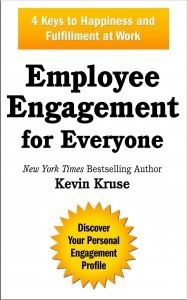Eric Mosley's Blog: The Globoforce Blog, page 36
July 24, 2013
Guest Blog: Grassroots Employee Engagement
 Yesterday’s great companies were built on cultures of top-down directive management. Tomorrow’s great companies are being built on a culture of individual empowerment, peer support and crowdsourced solutions.
Yesterday’s great companies were built on cultures of top-down directive management. Tomorrow’s great companies are being built on a culture of individual empowerment, peer support and crowdsourced solutions.
And when it comes to engagement, it’s critical to think about this paradigm shift. For example, whose job is employee engagement? Often in response to this question I hear, “HR owns engagement” or “our focus is on front-line managers.”
It turns out HR support and turning managers into lead...
July 23, 2013
The Secret to Respect in the Workplace
 Respect has gotten a lot of attention in the work environment lately, as it relates to equity, fairness and just getting along. In fact, I think most of us will agree a healthy level of respect is probably the most potent ingredient for workplace civility.
Respect has gotten a lot of attention in the work environment lately, as it relates to equity, fairness and just getting along. In fact, I think most of us will agree a healthy level of respect is probably the most potent ingredient for workplace civility.
But respect reaches much further than manners and compliance. It also plays a key role in recognition, engagement, and in creating a strong organizational culture. Think about it. Recognition, at its core, is really just a form of respect. P...
July 18, 2013
5 Tips to Create Happier Employees

Did you know that happier workers help their colleagues 33% more often than unhappy ones? Happy employees also achieve their goals 31% more often, and are 36% more motivated in their work. This is according to joint research from the Wall Street Journal and iOpener Institute.
Employee happiness has become an important and growing business concern over the past few years, as more and more companies recognize the benefits of having not just satisfied and engaged employees—but also employees who...
July 12, 2013
How NOT to Kill Creativity and Other Benefits of Peer-to-Peer Support

Harvard professor Teresa Amabile argues that peer support is critical to our creativity and success.
“Help each other note progress in the work, even if it’s a small win in the midst of an otherwise frustrating day, and be sure to recognize—even celebrate—your individual and collective progress!”
So explains Teresa Amabile, a professor and director of research at Harvard Business School, in our interview, “Peer-to-Peer Support and Other Motivators at Work.” A psychologist, Dr. Amabile studies h...
July 9, 2013
What Barbra Streisand Can Teach Us About Employee Engagement
 There’s an interesting scientific principle called the Streisand Effect. The term was originally coined to describe the effects of trying to censor information on the Internet, but it has also taken on a more general meaning about unintended consequences of our actions.
There’s an interesting scientific principle called the Streisand Effect. The term was originally coined to describe the effects of trying to censor information on the Internet, but it has also taken on a more general meaning about unintended consequences of our actions.
In simple terms, it describes how actions with an intended purpose can backfire, making things worse than if just left alone. Did I say scientific principle? OK, maybe it’s not science, but fascinating nonetheless.
Here’s the st...
July 2, 2013
Why the Future Isn’t as Scary as You May Think
 In 2000, Sun Microsystems Chief Scientist Bill Joy wrote a now iconic article in Wired Magazine called “Why the Future Doesn’t Need Us.” Joy famously argued that emerging technologies like genetic engineering, nanotech and robotics (GNR) will make humans obsolete. Digitally created GNR technologies, said Joy, are self-replicating, and therefore unlimited in their scope and impact.
In 2000, Sun Microsystems Chief Scientist Bill Joy wrote a now iconic article in Wired Magazine called “Why the Future Doesn’t Need Us.” Joy famously argued that emerging technologies like genetic engineering, nanotech and robotics (GNR) will make humans obsolete. Digitally created GNR technologies, said Joy, are self-replicating, and therefore unlimited in their scope and impact.
Joy suggested that if these technologies became out of control, they would threaten the very existence of the huma...
June 27, 2013
The Most Important Job Skill for 2020, and How to Cultivate it
 Forget the ability to un-jam the copier, program arcane codes, or add ridiculously large numbers in your head. The #1 job skill for 2020 is empathy.
Forget the ability to un-jam the copier, program arcane codes, or add ridiculously large numbers in your head. The #1 job skill for 2020 is empathy.
This is according to an article on LinkedIn last week, written by Forbes contributor George Anders. His article, The Number One Job Skill in 2020, makes the observation that the common trait in all of our fastest growing occupations—from teaching to healthcare to customer service— is that each of them requires higher than average levels of empathy...
June 24, 2013
The Critical Importance of Connections
 In 1978, science historian James Burke created a documentary series for BBC television that I would claim is the greatest documentary series ever created. (Yes, even better than Ken Burns!) Called Connections, it rejects a more linear view of historical progress, and shows how interconnected our ideas are. It offered what at that time was an entirely new vision of technology and human interaction. Each episode traces an ancient technological moment through a series of seemingly unrelated even...
In 1978, science historian James Burke created a documentary series for BBC television that I would claim is the greatest documentary series ever created. (Yes, even better than Ken Burns!) Called Connections, it rejects a more linear view of historical progress, and shows how interconnected our ideas are. It offered what at that time was an entirely new vision of technology and human interaction. Each episode traces an ancient technological moment through a series of seemingly unrelated even...
June 19, 2013
How to Encourage Passionate Employees
 Yesterday, we talked about the dangers of having employees who “quit and stay”, and I posed the question: “How can we ensure that employees sustain their passion for their job and their company?”
Yesterday, we talked about the dangers of having employees who “quit and stay”, and I posed the question: “How can we ensure that employees sustain their passion for their job and their company?”
One answer is a formula from the Ken Blanchard Companies—a renowned coaching and leadership development firm. The formula consists of the “12 Employee Work Passion Factors.”
The 12 factors that drive passion break down into three buckets:
Job Factors
Autonomy– Empowering people to make decisions about th...
June 18, 2013
Do Your Employees Quit and Stay?

You might say that many in HR suffer from fear of abandonment. You monitor turnover rates. You create compensation plans to maximize employee retention. You do succession planning to ensure people have a pathway to develop within the organization. In other words, you pour a ton of effort and energy into ensuring people don’t leave.
The thought of employees quitting and leaving is scary. But here’s what’s scarier and more insidious: employees who quit and stay.
At a fundamental level, when emplo...



